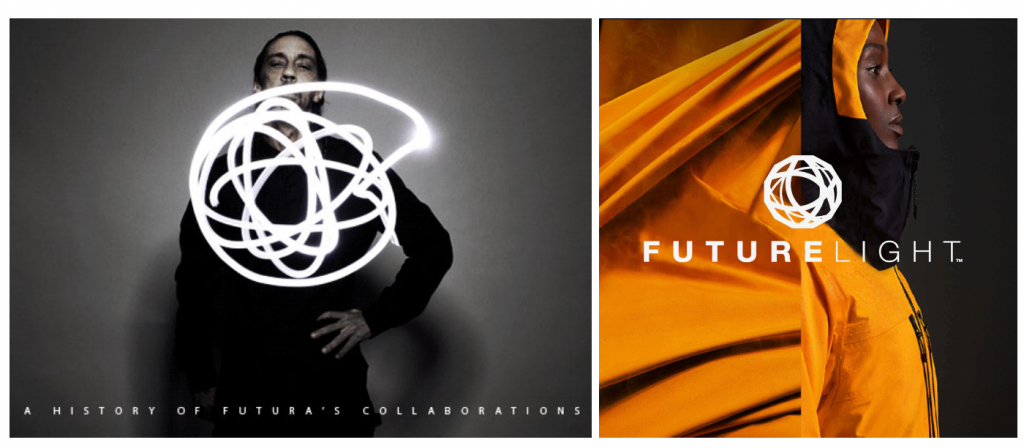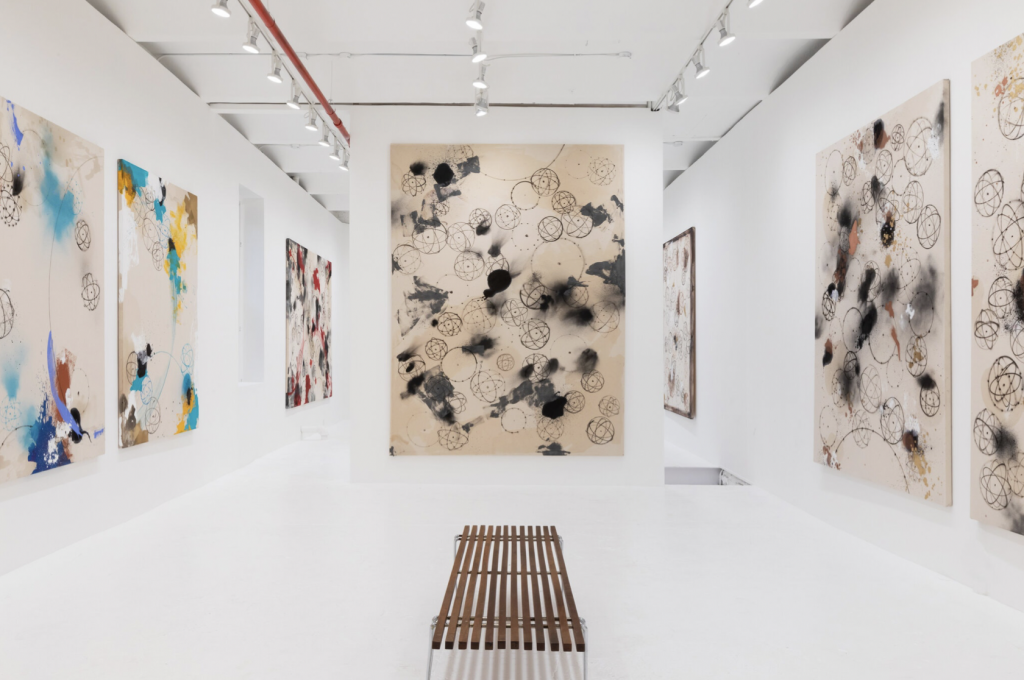North Face has collaborated with Futura in the past, but failed to get his authorization “before making extensive use of [a logo that he created] in a $20 million advertising campaign,” counsel for the graffiti artist claims in a newly-filed unfair competition lawsuit. According to the complaint that he filed in a California federal court on Tuesday, Leonard McGurr – aka Futura – alleges that North Face “inexplicably began using a copy of” his famous the “atom” design as the logo for a new line of apparel and fabric technology in 2019 “without [his] consent.”
Hardly an unknown design, McGurr – who describes himself as “a pioneer in graffiti and street art” – claims that he “has become known for a signature element that appears over and over in his work: a particular stylized depiction of an atom,” which he has used repeatedly over the past fifty years “as a traditional logo, to identify himself as the source of consumer products he offers, including apparel.”
If the logo that appears in North Face’s ad campaign is “not enough to conjure FUTURA in the mind of a consumer, [North Face] calls the new apparel line ‘FUTURELIGHT.’” McGurr claims that “the similarity of the graphic designs and the names is no coincidence: [North Face] purposefully invoked [McGurr] in order to suggest an association with him.” Still yet, McGurr suggests that the timing of North Face’s allegedly unauthorized use of his logo is not without significant, as he “is now more popular and in demand than ever before,” with “two major shows in New York City at the moment, including a major solo show.”
More than that, McGurr notes that roster of collaborators is sizable, with the artist teaming up with the likes of “Nike, Uniqlo, LVMH, the New York Mets and Yankees, and Comme de Garcon[s].”
North Face’s allegedly “intentional, deliberate, willful, [and] wanton” conduct – which was “committed with the intention of injuring [McGurr] and depriving [him] of [his] legal rights” – has caused McGurr to “sustain serious and irreparable injury to [his] business and reputation.” As a result, McGurr sets forth claims of unfair competition under the Lanham Act and California state law, unfair business practices under California state law. And he claims that he “is entitled to all remedies available under the Lanham Act, including, but not limited to, preliminary and permanent injunctions, compensatory damages, treble damages, disgorgement of profits, costs and attorney’s fees.”
More than merely seeking preliminary and permanent injunctions, and damages from North Face and its parent company V.F. Corp., McGurr is also looking to have North Face’s relevant trademark registration cancelled. In the complaint, counsel for McGurr asserts that North Face’s “trademark registration has injured and will continue to injure [him] by causing the public to be confused or mistaken into believing that [its] goods were designed by, or otherwise affiliated with [him].”

“Accordingly, [North Face’s] use of its registered mark … will damage [McGurr] because [North Face’s] mark is likely, when used on or in connection with the goods and services described in the subject registration, to cause confusion, or to cause mistake or to deceive.” As such, “the mark should not have been registered and is unregistrable,” per McGurr.
It is not entirely clear what registration McGurr is looking to invalidate, as he does not specify a registration number in the complaint – and in fact, North Face does not appear to have a registration for its allegedly infringing version of the “atom Design.” However, what North Face does have is a pending trademark application for registration for a mark that consists of “multiple curved lines forming a spherical shape” for use on everything from luggage and backpacks, sleeping bags and tents to clothing and on-line retail services, which it filed on a 1B basis in October 2018.
That mark is still pending before the U.S. Patent and Trademark Office, with North Face filing and receiving an intent to use extension in August.
The case is the latest in an enduring strong of street art-specific proceedings, with H&M, Moschino and its creative director Jeremy Scott, Roberto Cavalli, American Eagle Outfitters, Coach, Vince Camuto, and Mercedes among the companies that have been sued in recent years – most commonly on a copyright infringement basis, with a recent Banksy case being an exception – for allegedly making unauthorized use of others’ works, either on their products or in many cases, in the background of ad campaigns.
Despite arguments to the contrary from the likes of H&M, Moschino, and co., which have argued in the past that graffiti is not subject to copyright protection because street artists rarely own the buildings and/or walls upon which their work appears, thereby, potentially making the act of tagging form of vandalism), “Street art, like traditional art forms, is automatically protected by copyright law,” says DLA Piper’s Michael Garfinkel. “Even when street art is created with the purpose of being readily reproduced, intellectual property law does not treat it differently from other art forms.”
(H&M faced so much backlash in light of its response to the case that Jason Williams a/k/a Revok filed against it that it voluntarily dismissed its complaint in March 2018, saying in a statement, “H&M respects the creativity and uniqueness of artists, no matter the medium. We should have acted differently in our approach to this matter. It was never our intention to set a precedent concerning public art or to influence the debate on the legality of street art. As a result, we are withdrawing the complaint filed in court. We are currently reaching out directly to the artist in question to come up with a solution. We thank everyone for their comments and concerns, as always, all voices matter to us.”)
Garfinkel notes that brands, “social media influencers and advertising agencies (and others seeking to monetize a street artist’s work) should not use such publicly available works for commercial purposes without the permission from artists,” noting that the enduring use of such works by brands “continues to soar in popularity, so too will the disputes over the relevant rights.”
A representative for North Face told TFL that the company cannot comment on pending litigation.
*The case is Leonard McGurr v. The North Face Apparel, V.F. Corp., et al., 2:21-cv-00269 (C.D.Cal.).














